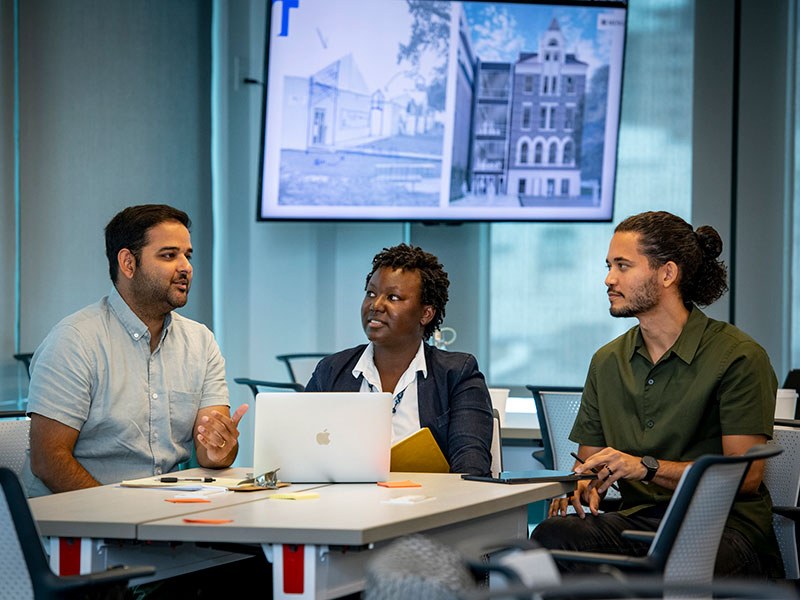Third Architecture Fellow joins Tulane

The national Deans' Equity and Inclusion Initiative, co-founded by the Tulane University School of Architecture, is entering its second year with a new cohort of early career faculty working to advance socio-ecological and spatial justice, equity and inclusion.
Fallon S. Aidoo, an assistant professor of real estate and historic preservation at Tulane, is one of 17 faculty members from across the United States who will participate in the fellowship program. She and the other cohort members are considered significant contributors to the pursuit of equity and inclusion in and through the built environment.
Aidoo joins Architecture and Urbanism Fellow Omar Ali and Architecture and Social Innovation Fellow Emmanuel Osorno, who were appointed new faculty members at Tulane School of Architecture for the initial 2021-2023 cohort.
"The fellows are contributing to TuSA very substantially and are helping to make a more just built environment through bringing new perspectives.”
-Iñaki Alday, dean of the Tulane School of Architecture
The initiative began in 2021 with the Tulane School of Architecture and six other schools and colleges of architecture, landscape architecture, planning, preservation and design searching for ways to increase diversity through creating a pipeline. It is now a partnership of over two dozen schools, each of which nominates fellows with attention to BIPOC and other underrepresented faculty dedicated to the built environment professions and disciplines.
Fellows participate in a two-year cohort, including two summer institutes and academic year-round professional development workshops. Additionally, fellows are paired with mentors from their schools as well as mentors from other institutions.
Iñaki Alday, dean of the Tulane School of Architecture said the first year of the initiative proved to be a major success with the participation of eight fellows, including Ali and Osorno, who are now part of Tulane’s architecture faculty.
“Now, we are even more convinced of the potential of this approach: to facilitate the access to the university to early career and future academics from underrepresented minorities,” Alday said. “The fellows are contributing to TuSA very substantially — each in his own area of focus — and are helping to make a more just built environment through bringing new perspectives.”
Osorno, an architect, designer and educator, said the Initiative has given him an up-close look at the intricacies of higher education and enabled him to be part of network of individuals who are committed to social justice, equity, education and scholarship. “These meetings have not only solidified my interest in academia, but have also demystified it, allowing me to begin to define my role within it. I feel honored and privileged to be part of such an inspiring program."
Ali, a designer and educator, agreed. “Hearing about their experiences and insights navigating the challenging landscape of academia has been especially beneficial and has helped to shape my trajectory and career path. I feel fortunate to have been a part of the inaugural class of fellows and hope to repay in kind in the future.”
As a new fellow, Aidoo is eager to develop relationships with both veteran and early-career academics who can help shape her teaching and research of real estate development and preservation at Tulane. Aidoo's research centers around real estate reinvestment, restoration, rehabilitation and retrofit by governmental, private, philanthropic and nonprofit organizations — and the lack of such in places predominantly occupied by Black, Indigenous, and immigrant populations.
“I am particularly excited to learn from academic administrators about pathways to tenure,” she said. “One of the reasons I joined the faculty of Tulane's School of Architecture is to advance these pedagogical, investigative, and institutional approaches to spatial and social justice with support not only from my deans but also a cohort of colleagues teaching and researching how, why and for whom built environments have or will become more or less equitable and sustainable.”